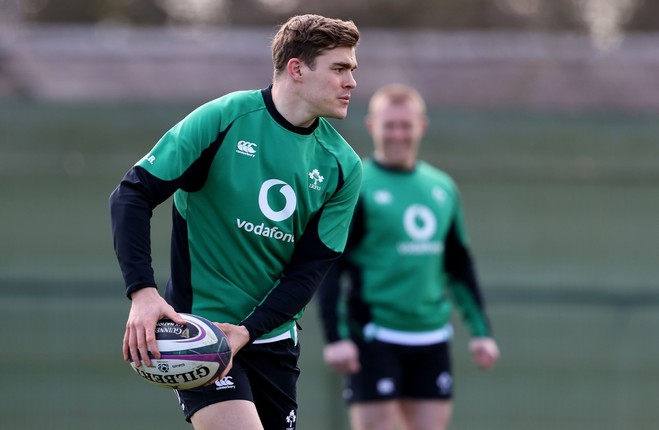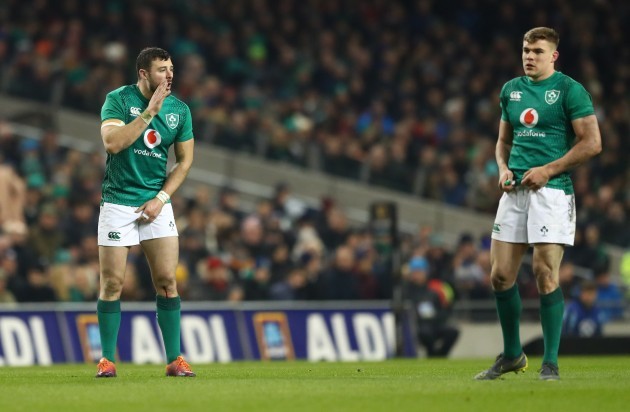IT IS NO surprise that a generation of players so heavily shaped by detailed thinkers like Joe Schmidt and Stuart Lancaster would turn out to be such diligent students.
The early half of this year’s Six Nations saw communication issues within the Ireland squad flagged as a weak point. What is sometimes lost in that discussion is the fact that while some of those players could be better at getting messages across, they have absolutely no problem taking information in.
Ireland’s current midfielders are a good example. Neither Robbie Henshaw or Garry Ringrose would be considered the most vocal presences on the pitch, but both try lead through their actions and pore over their game in search of ways to better themselves.
Henshaw recently spoke about using last year’s lockdown to fine-tune his footwork in a bid to become a more potent attacking threat in the face of improving defensive systems. Since international rugby returned last autumn, he has been one of Ireland’s more dangerous ball-carriers and arguably the team’s standout performer.
Ringrose hasn’t quite generated as many headlines, but it’s been a difficult 12 months for the Leinster centre. Before this year’s Six Nations got underway he had only played twice for Ireland since trudging off the field after that gutting 32-point defeat to New Zealand at the 2019 World Cup.
He started against Scotland last February in the first game of the Andy Farrell era but missed the subsequent games against Wales and England with a finger injury. He was back at 13 for the first Ireland game after lockdown, but shattered his jaw against Italy and missed the Autumn Nations Cup as a result.
Fit and in-form, he’s been one of the more straight-forward selections for Andy Farrell this time around, starting all three of Ireland’s games alongside Henshaw.
The pair provide an important source of creativity for Ireland, and if Farrell’s team are to become more adept at the ‘heads up’ rugby they say they are striving for, the gifted Leinster duo will have big roles to play.
Ringrose puts plenty of thought into his own attacking game, and explains there is a lot of homework that goes into being able to make those correct split-second decisions.
“I don’t want to go on for ages, but for me, in terms of my own preparation, it’s a process and it’s trying to be as meticulous as possible in terms of looking at the opposition, looking at training, at myself, at the players around me,” he says.
What influences my decision-making, what influences other people’s decision-making, what picture did I see or not see… There’s a whole host of things we analyse in significant detail, but at the same time you do have to declutter the mind.
“With that preparation, you can trust yourself to relax and play what you see to a certain extent.
“I don’t know if that makes sense, but I don’t get that right every time and sometimes I’m better than others and I come away from games and find five things I could have done better or differently.”
The 26-year-old possesses one of Ireland’s sharpest attacking minds, but like many of his teammates he has been guilty of some costly decisions in this Six Nations.
While being held up by two Welsh bodies in Cardiff on the opening weekend, his loose offload attempt led to Ireland losing possession in the build-up to a try which saw Wales bring the game level with 30 minutes to play.
“It’s trusting your instinct,” Ringrose continues.
“That Welsh game, trying to throw the offload to Johnny (Sexton)… Obviously, in hindsight, where we are on the pitch and on the scoreboard, a man down, that’s probably not the best decision to make and that’s irrespective of the outcome.
“Having said that, there is an element – and it’s a cliché – but fortune favours the brave and you do have to push the boundaries to a certain extent.
“Similarly, against Italy, you’re playing through the line and Hugo (Keenan) scored. Two similar actions, two very different outcomes and for me it is just trying to understand the decision-making process going into that and hoping I have more of the Hugo Keenan ones than the Wales ones, if that makes sense.
So, it is a constant back and forth between the process, the detail, analysing the decision-making, the positioning and a whole host of things like communication and getting that right and then also decluttering and trusting an instinct that’s built off the preparation we do.
“So, trusting my instinct in the sense that the work I’ve done away from it will lead to the right decisions in the moment.”
Ireland looked far more assured as a unit last time out in Rome, where their poorly organised opponents provided a perfect stage for Farrell’s charges to let their hair down and play with a bit more freedom.
How they would love to produce the same attacking intent in Edinburgh on Sunday.
“I suppose for me, from an attacking perspective it’s about getting the balance right when you’re trying to break a team down between taking the line on or preserving space or playing early or a bit laterally to try and challenge the defence in a different way,” Ringrose continues.
“Probably against France, from my perspective I was guilty of being a bit lateral and despite the space being there it’s not the most effective way of getting there.
“So, against Italy… I’m not naive to the fact that I don’t think they, when they’re reviewing themselves, would say they had the best defensive performance, but I do think we were better in the balance of taking the line on as well as playing to space if that makes sense.
“For us, to break down Scotland who are defensively very strong it will be getting that balance right of taking the line on and winning the gainline but also preserving space and letting the ball do the work to get there. That’s excluding the attacking kicking game as well, but certainly from a ball-in-hand perspective you need to get that balance right.
“If you do that, then some of the things you’re talking about like playing an offload or playing through the line like that can happen, but also there’s stuff that might go a bit unnoticed like when there’s a break down the edge and the guys didn’t take everything out of the ball earlier on in the play.
“So, it’s a challenge and you’re presented with different pictures from game to game, so it’s trying to make the right decisions off the back of it.”
Gavan Casey, Bernard Jackman, and Murray Kinsella discuss CVC’s share in the Six Nations, TV rights, Ireland’s trip to Edinburgh, and last weekend’s inter-pros:
The42 Rugby Weekly / SoundCloud


